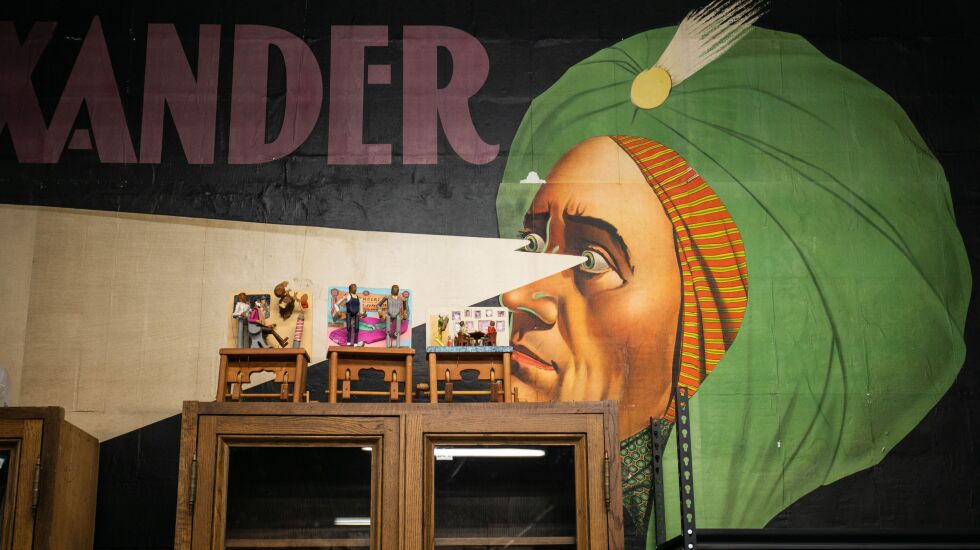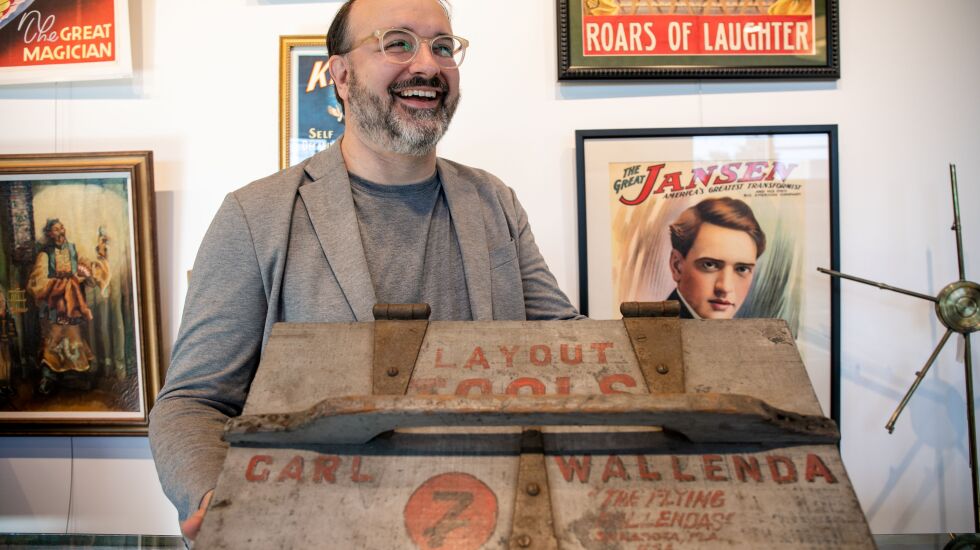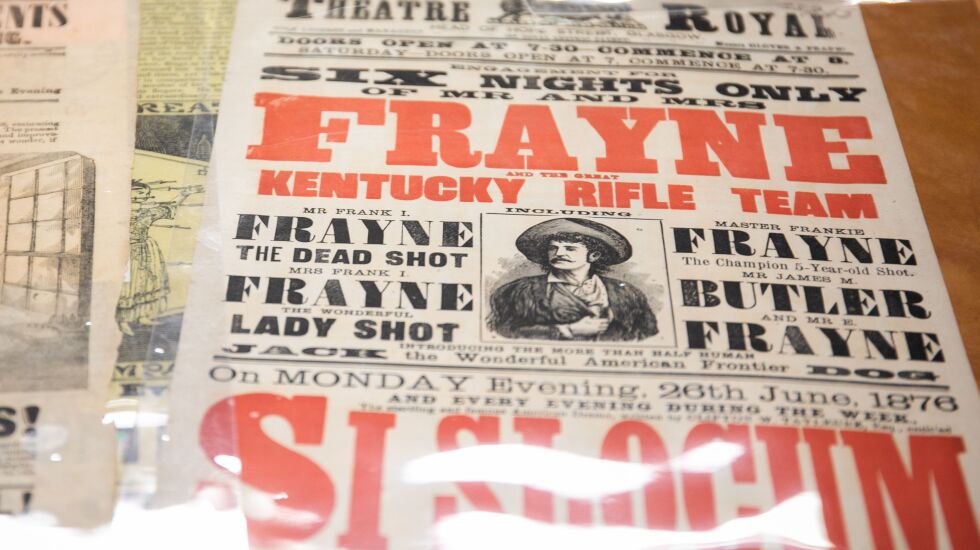
The brick warehouse on the Northwest Side is a place you could drive by a thousand times without ever wondering what’s inside.
It doesn’t help that some of the windows are bricked over, others too high to see through.
The building’s owner, Gabe Fajuri, isn’t particularly worried about burglars.
“If you stole an automaton bear that drinks wine, who is going to sell it for you?” Fajuri said, pointing to a 1930s plug-in teddy bear holding a tin cup in one hand and a bottle of booze in the other.
Fajuri — a Detroit native whose neatly trimmed beard, thinning hair and glasses bring to mind a friendly shrink — is underselling the merchandise.
On the other side of the brick walls lies an auction house crammed with the weird and wonderful. Potter & Potter specializes in vintage magic memorabilia, although it handles many other items as well. On Oct. 29, Harry Houdini’s “automatic flowering rosebush,” a 1940s “vanishing radio” and an 1890 “spirit trumpet” will be among the hundreds of items on auction. There’s also a “Fu Manchu hand chopper” and countless books about magic and its history — all of it coming from a Cincinnati man with a museum built 85 feet beneath his home and reached by private elevator.
“You’d walk up to a mirror, and the mirror would swing open. Now there is a whole room decorated like an Egyptian tomb,” Fajuri said.
But Fajuri bristles at the suggestion that he’s merely running a magic or costume shop.
“While I understand we sell posters with clowns on them, we’re not clowns ourselves. We’re selling [for example] a first edition of Moby Dick for $60,000 or something signed by Picasso,” he said.

The auctioneers also recently handled the sale of the circus exhibit from the Museum of Science and Industry. One item, a mechanical re-creation of a big top, sold for $14,400, Fajuri said.
A stop at the front reception desk offers a taste of the building’s inner life. Last week, someone called wanting to know if Potter & Potter would be interested in auctioning off a painting by serial killer John Wayne Gacy.
“The number of conversations here that don’t happen anywhere else,” Fajuri said, before joking, “Would you mind taking the vanishing radio off of the spirit cabinet?”
Fajuri said his interest in magic and collecting began as a child growing up in suburban Detroit. His father, a lawyer, would bring home books on magic tricks.
“By the time I was 15, I was going to conventions where people were talking about the history of collecting,” he said.
In college, he sold items on eBay to make a little extra cash.
He started his auction house — Potter is the English translation of his Jordanian name — in 2007.
Almost every object has a story. One day last week, Fajuri led a visitor through the warehouse. A scattering of circus mannequins lay on the concrete floor, their arms raised as if protesting the indignity of their circumstances. Fajuri picked up a vintage circus playbill for Frank I. Frayne, a rifleman. A favorite trick involved standing with his back to another performer and using a mirror to shoot an apple off the performer’s head.
During one performance, Frayne accidentally shot and killed his fiancée.
“One story is that he committed suicide” after the accident, Fajuri said. “But the fact is, he lived another eight or nine years” and got married, he said.

The tour wound through a studio, where items are cataloged and photographed for upcoming auctions. The warehouse itself has a musty odor and is filled with every kind of curiosity imaginable: a roulette wheel from America’s gold rush days, carousel horses, a circus wagon wheel, a 1940s Philco TV.
Much of what Faguri auctions come from estates.
“They say there are three Ds in the auction business: death, divorce and debt,” he said.
Sometimes he’s in the house with a divorcing couple and must take on the role of a family counselor, he said.
He won’t take just anything — cookware, furniture, for example.
He’s sold mummified heads, “strange taxidermy” and torture devices from another era.
“We’ve sold them on occasion. It’s not like we’re out looking for it,” he said.
Buyers range from Hollywood celebrities (he won’t name them) to everyday folks — collectors and hoarders.
“Next week I’m going to North Carolina, and one of the two stops I’m making, the gentleman has six buildings filled with antiques,” Fajuri said.
Some objects fetch a few dollars at auction, all the way up to $150,000 last year for a wooden chest owned by the 19th century French illusionist, Jean-Eugène Robert-Houdin.
And if anything, the pandemic has been a boon to business, said Fajuri and owners of several other Chicago-area auction houses. With lockdowns in place, it helped potential bidders get used to the idea of online auctions.
“We used to do a hybrid auction, where it was both live in-person bidders and also internet bidders. When COVID started, we went to a strictly online model, ... and we have not gone back and don’t have any plans to,” said John Leonard, who owns Leonard Auction, an estate auction house based in Addison.
“We have found that bidders like it better. They seem to respond better and they seem to be spending more money that way.”
Leonard said 2020 was the company’s best year ever.
“After we got over the initial shock, it ended up being the best year we ever had — 2020. And it’s gone up since then,” Fajuri said.
Some of Fajuri’s most intriguing objects can be found in his office: Gold-leafed books, some dating to the 1600s, that expose witches as charlatans. There’s a tiny silver chest that opens to reveal a twittering, fluttering songbird.
What he won’t reveal, unless it’s already widely known or explained in a book, are the secrets behind the magic objects in his possession. Many of Fajuri’s closest friends are magicians and he grew up doing magic tricks. He says he owes the magicians, past and present, an allegiance.
“It’s far more interesting to be bewildered or wonder at how it happened than it is to learn that I had a piece of double-stick tape in my hand,” he said.







